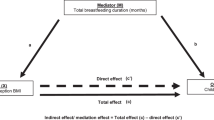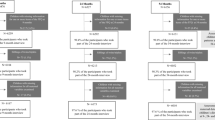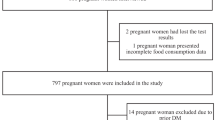Abstract
Objective:
To investigate the repeatability of maternal self-reported prenatal, perinatal and early postnatal factors within the IDEFICS (Identification and prevention of dietary- and lifestyle-induced health effects in children and infants) study.
Design:
Data are from the baseline survey of the longitudinal cohort study IDEFICS in eight European countries.
Subjects:
A total of 420 parents from eight countries (43–61 per country) were asked to complete the parental questionnaire (PQ) twice at least 1 month apart.
Measurements:
The PQ assesses prenatal (maternal weight gain), perinatal (child's birth weight and length, Caesarean (C)-section, week of delivery) and early postnatal factors (exclusive breastfeeding, breastfeeding, introduction of solid food). Intra-class correlation coefficients (ICCs) were calculated to compare maternal reports on prenatal, perinatal and early postnatal factors between the first and second PQ.
Results:
In total, 249 data sets were considered for the analyses. Overall, maternal reports for prenatal and perinatal factors showed higher repeatability (ICC=0.81–1.00, P⩽0.05 for all) than those for early infant nutrition (ICC=0.33–0.88, P⩽0.05 for all). Perfect agreement was found for parental reports on C-section (ICCall=1.00, P⩽0.05). There was stronger agreement for duration of breastfeeding (ICC=0.71, P⩽0.05) compared with exclusive breastfeeding (ICC=0.33, P⩽0.05). Maternal reports showed moderate correlation for the introduction of several types of food (cereals ICC=0.64, P⩽0.05; fruits ICC=0.70, P⩽0.05; meat ICC=0.83, P⩽0.05; vegetables ICC=0.75, P⩽0.05), and high correlation (ICC=0.88, P⩽0.05) for cow's milk.
Conclusion:
Maternal reports on pregnancy and birth were highly reproducible, but parental recall of early infant nutrition was weaker and should be interpreted more cautiously.
This is a preview of subscription content, access via your institution
Access options
Subscribe to this journal
Receive 12 print issues and online access
$259.00 per year
only $21.58 per issue
Buy this article
- Purchase on Springer Link
- Instant access to full article PDF
Prices may be subject to local taxes which are calculated during checkout
Similar content being viewed by others
References
Ahrens W, Bammann K, de Henauw S, Halford J, Palou A, Pigeot I et al. Understanding and preventing childhood obesity and related disorders – IDEFICS: a European multilevel epidemiological approach. Nutr Metab Cardiovasc Dis 2006; 16: 302–308.
Bammann K, Peplies J, Sjöström M, Lissner L, De Henauw S, Galli C et al. Assessment of diet, physical activity, biological, social and environmental factors in a multi-centre European project on diet- and lifestyle-related disorders in children (IDEFICS). J Public Health 2006; 14: 279–289.
Ahrens W, Bammann K, Siani A, Buchecker K, De Henauw S, Iacoviello L et al. The IDEFICS cohort: design, characteristics and participation in the baseline survey. Int J Obes 2011; 35 (Suppl 1): S3–S15.
Boney CM, Verma A, Tucker R, Vohr BR . Metabolic syndrome in childhood: association with birth weight, maternal obesity, and gestational diabetes mellitus. Pediatrics 2005; 115: e290–e296.
Ibánez L, Ong KKL, Dunger DB, de Zegher F . Early development of adiposity and insulin resistance after catch-up weight gain in small-for-gestational-age children. J Clin Endocrinol Metab 2006; 91: 2153–2158.
Weyermann M, Rothenbacher D, Brenner H . Duration of breastfeeding and risk of overweight in childhood: a prospective birth cohort study from Germany (abstract). Int J Obes 2006; 30: 1281–1287.
Toschke AM, Martin RM, von Kries R, Wells J, Smith GD, Ness AR . Infant feeding method and obesity: body mass index and dual-energy X-ray absorptiometry measurements at 9-10 y of age from the Avon Longitudinal Study of Parents and Children (ALSPAC). Am J Clin Nutr 2007; 85: 1578–1585.
Olson JE, Shu XO, Ross JU, Pendergrass T, Robison LL . Medical record validation of maternally reported birth characteristics and pregnancy-related events: a report from the children's cancer group. Am J Epidemiol 1997; 145: 58–67.
Rice F, Lewis A, Harold G, van den Bree M, Boivin J, Hay DF et al. Agreement between maternal report and antenatal records for a range of pre and peri-natal factors: the influence of maternal and child characteristics. Early Hum Dev 2007; 83: 497–504.
Tomeo CA, Rich-Edwards JW, Michels KB, Berkey CS, Hunter DJ, Frazier AL et al. Reproducibility and validity of maternal recall of pregnancy-related events. Epidemiology 1999; 10: 774–777.
Launer LJ, Forman MR, Hundt GL, Sarov B, Chang D, Berendes HW et al. Maternal recall of infant feeding events is accurate. J Epidemiol Community Health 1992; 46: 203–206.
Tienboon P, Rutishauser IHE, Wahlqvist ML . Maternal recall of infant feeding practices after an interval of 14 to 15 years. Aust J Nutr Diet 1994; 51: 25–27.
Strippoli M-PF, Silverman M, Michel G, Kuehni CE . A parent-completed respiratory questionnaire for 1-year-old children: repeatability. Arch Dis Child 2007; 92: 861–865.
Shrout PE, Fleiss JL . Intraclass correlations: uses in assessing rater reliability. Psychol Bull 1979; 2: 420–428.
World Health Organization (WHO). Obesity: preventing and managing the global epidemic. World Health Organ Tech Rep Ser 2000; 894: i-xii, 1–253.
Troude P, L'Hélias LF, Raison-Boulley AM, Castel C, Pichon C, Bouyer J et al. Perinatal factors reported by mothers: do they agree with medical records? Eur J Epidemiol 2008; 23: 557–564.
Sanderson M, Williams MA, White E, Daling JR, Holt VL, Malone KE et al. Validity and reliability of subject and mother reporting of perinatal factors. Am J Epidemiol 1998; 147: 136–140.
Yawn BP, Suman VJ, Jacobsen SJ . Maternal recall of distant pregnancy events. J Clin Epidemiol 1998; 51: 399–405.
Adegboye ARA, Heitmann BL . Accuracy and correlates of maternal recall of birth weight and gestational age. BJOG 2008; 115: 886–893.
Michels KB, Willett WC, Graubard BI, Vaidya RL, Cantwell MM, Sansbury LB et al. A longitudinal study of infant feeding and obesity throughout life course. Int J Obes 2007; 31: 1078–1085.
Vobecky JS, Vobecky J, Froda S . The reliability of the maternal memory in a retrospective assessment of nutritional status. J Clin Epidemiol 1988; 41: 261–265.
Harder T, Schellong K, Plagemann A . Differences between meta-analyses on breastfeeding and obesity support causality of the association. Pediatrics 2006; 117: 987.
Haaga JG . Reliability of retrospective survey data on infant feeding. Demography 1988; 25: 307–314.
Seidman DS, Slater PE, Ever-Hadani P, Gale R . Accuracy of mothers' recall of birth weight and gestational age. Br J Obstet Gynaecol 1987; 94: 731–735.
Hakim RB, Tielsch JM, See LC . Agreement between maternal interview- and medical record-based gestational age. Am J Epidemiol 1992; 136: 566–573.
Acknowledgements
This work was carried out as part of the IDEFICS study (http://www.idefics.eu). We acknowledge the financial support of the European Community within the Sixth RTD Framework Programme Contract No. 016181 (FOOD) and the grant support from the EU for the IDEFICS study.
The information in this document reflects the author's view and is provided as it is.
Author information
Authors and Affiliations
Consortia
Corresponding author
Ethics declarations
Competing interests
The authors declare no conflict of interest.
Additional information
Statement of ethics
We certify that all applicable institutional and governmental regulations regarding the ethical use of human volunteers were followed during this research. In each country, the participating centres obtained ethical approval from their responsible authority. All participating children and their parents provided oral and/or written informed consent for all examinations and/or the collection of samples, subsequent analyses and storage of personal data and collected samples.
Rights and permissions
About this article
Cite this article
Herrmann, D., Suling, M., Reisch, L. et al. Repeatability of maternal report on prenatal, perinatal and early postnatal factors: findings from the IDEFICS parental questionnaire. Int J Obes 35 (Suppl 1), S52–S60 (2011). https://doi.org/10.1038/ijo.2011.35
Published:
Issue Date:
DOI: https://doi.org/10.1038/ijo.2011.35
Keywords
This article is cited by
-
Two-Year Test-Retest Reliability of the Breastfeeding Duration Question Used By the Pregnancy Risk Assessment Monitoring System (PRAMS): Implications for Research
Maternal and Child Health Journal (2021)
-
Potential selection effects when estimating associations between the infancy peak or adiposity rebound and later body mass index in children
International Journal of Obesity (2017)
-
Prevalence of overweight and obesity in European children below the age of 10
International Journal of Obesity (2014)
-
Gestational weight gain and adiposity, fat distribution, metabolic profile, and blood pressure in offspring: the IDEFICS project
International Journal of Obesity (2013)
-
Head circumference and height abnormalities in autism revisited: the role of pre- and perinatal risk factors
European Child & Adolescent Psychiatry (2013)



